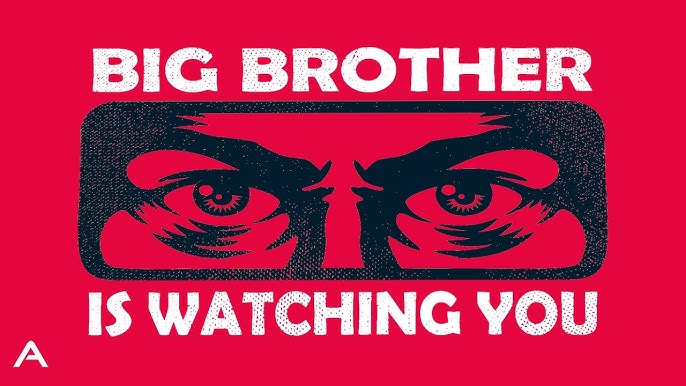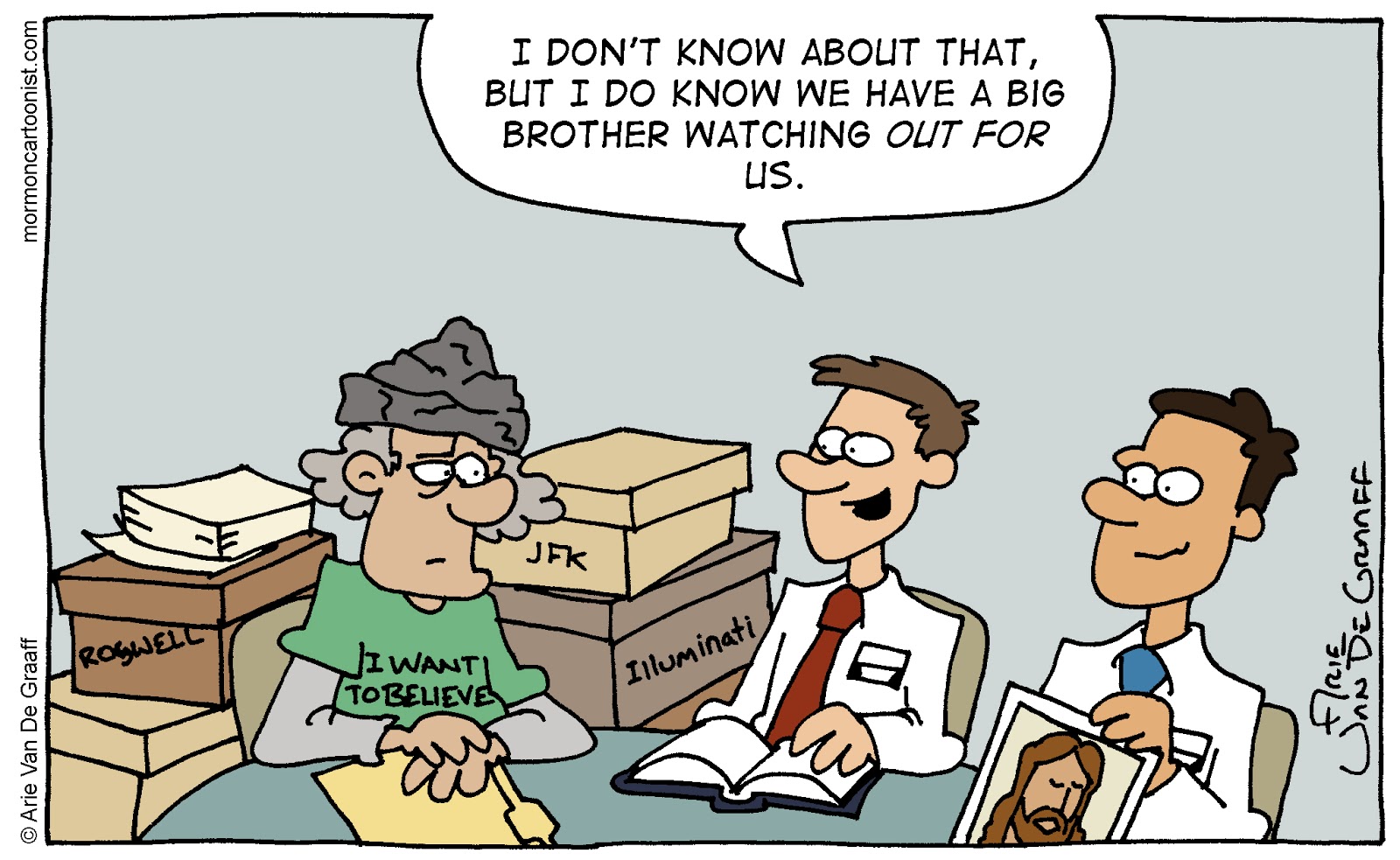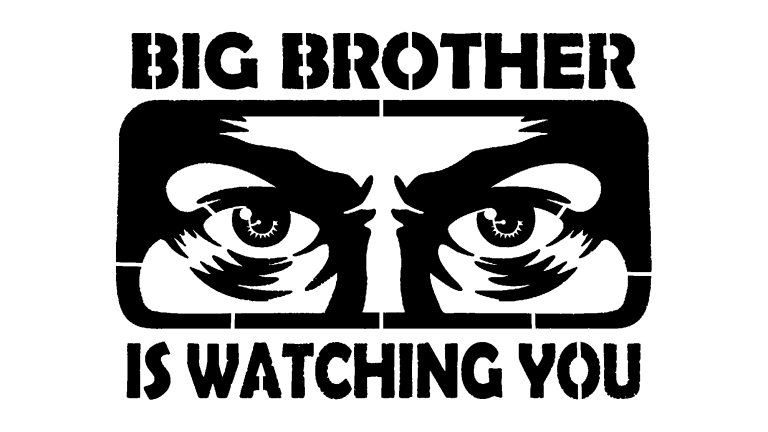Big Brother is watching you, the chilling phrase from George Orwell’s 1984, encapsulates the terror of omnipresent surveillance and authoritarian control.
First published in 1949, this George Orwell Big Brother quote has become a cultural touchstone, symbolizing the loss of privacy and individual freedom in a dystopian society.
Set in a totalitarian regime where the Party, led by the enigmatic Big Brother, monitors every aspect of life, the novel’s themes resonate powerfully in 2025 amid modern surveillance technologies and debates over personal liberties.
Big Brother is Watching You Meaning
Big Brother is watching you meaning lies in its portrayal of a surveillance state where citizens are constantly monitored, stripped of autonomy, and coerced into conformity.

In 1984, the phrase appears on posters featuring Big Brother’s stern face, reminding citizens of the Party’s omnipresence.
Key aspects of its meaning:
-
Psychological Control: Instills fear, ensuring compliance without physical force.
-
Loss of Privacy: No action or thought escapes scrutiny, erasing personal freedom.
-
Propaganda Tool: Reinforces Big Brother’s godlike authority, making rebellion unthinkable.
-
Manipulation: Encourages self-censorship, as citizens internalize surveillance.
The phrase captures the essence of a society where individuality is crushed under the weight of constant observation, a warning that remains relevant in 2025.
Origin of Big Brother is Watching You
The origin of Big Brother is watching you traces back to George Orwell’s 1984, published on June 8, 1949. Orwell, an English novelist and critic, drew inspiration from real-world totalitarian regimes and his observations of propaganda and censorship.
Historical Context
-
World War II: Orwell witnessed the rise of Nazi Germany and Stalin’s Soviet Union, where state surveillance and propaganda were rampant.
-
Post-War Fears: The Cold War’s onset fueled anxieties about authoritarianism and technological control.
-
Personal Experiences: Orwell’s work as a BBC propagandist during the war exposed him to information manipulation.
Creation of the Phrase
-
Orwell coined Big Brother as a figurehead for the Party, inspired by Stalin’s cult of personality and wartime posters.
-
The phrase Big Brother is watching you first appears in Chapter 1 of 1984, setting the novel’s oppressive tone.
-
Orwell’s intent was to warn against unchecked power, a message that took root globally.
By 1950, the novel had sold over 400,000 copies, cementing the phrase’s cultural impact.
George Orwell Big Brother Quote in Context
The George Orwell Big Brother quote, “Big Brother is watching you,” is one of 1984’s most iconic lines, appearing repeatedly to underscore the Party’s control. Its context within the novel reveals its chilling effect:
-
Setting: Posters of Big Brother—described as a “black-mustachio’d face” with piercing eyes—adorn public spaces in Oceania, the novel’s fictional superstate.
-
Purpose: The quote reinforces the Party’s surveillance network, including telescreens, hidden microphones, and informants.
-
Impact on Characters: Protagonist Winston Smith feels suffocated, knowing even his thoughts (thoughtcrime) are monitored.
-
Repetition: The phrase recurs in Chapters 1, 3, and 7, amplifying its psychological weight.
Orwell’s masterful use of this quote makes it a shorthand for totalitarian oppression, quoted in millions of discussions on freedom and privacy.
Big Brother 1984 Explanation
Big Brother 1984 explanation centers on the character and concept of Big Brother as the Party’s supreme leader in Orwell’s dystopian novel. Though never confirmed to exist as a real person, Big Brother is the face of absolute power.
Role in the Novel
-
Figurehead: Big Brother symbolizes the Party’s authority, appearing on posters, coins, and propaganda.
-
Surveillance Enforcer: His omnipresence, via the slogan Big Brother is watching you, ensures citizen obedience.
-
Cult of Personality: Citizens are forced to love Big Brother, with dissenters tortured or “vaporized.”
-
Ambiguity: The novel leaves unclear whether Big Brother is a living leader or a fabricated icon.
Mechanisms of Control
-
Telescreens: Two-way devices in every home and workplace monitor behavior and broadcast propaganda.
-
Thought Police: Detect thoughtcrime, punishing disloyalty before it manifests.
-
Doublethink: Forces citizens to accept contradictory beliefs, like Big Brother’s infallibility.
-
Newspeak: A language designed to limit free thought, reducing rebellion’s vocabulary.
Big Brother’s grip on Oceania illustrates the dangers of totalitarianism, a warning Orwell crafted with precision.
Symbolism of Big Brother is Watching You

Symbolism of Big Brother is watching you lies in its representation of oppressive surveillance and the erosion of individuality. The phrase and Big Brother’s image carry multiple layers of meaning:
-
Omnipresent Authority: The ever-watchful eyes symbolize a government that sees all, crushing dissent.
-
Fear and Intimidation: The slogan instills paranoia, making citizens police themselves.
-
Loss of Truth: Big Brother’s control over history and facts reflects propaganda’s power to distort reality.
-
Dehumanization: Constant monitoring reduces people to obedient drones, stripping agency.
In 1984, the symbolism is reinforced by the Party’s slogan: “War is Peace, Freedom is Slavery, Ignorance is Strength,” which complements Big Brother’s oppressive gaze.
Big Brother in Orwell’s 1984
Big Brother in Orwell’s 1984 is both a character and an ideological construct, embodying the Party’s totalitarian rule. His presence permeates every aspect of life in Oceania.
Physical Description
-
Appearance: A “ruggedly handsome” man in his 40s, with a black mustache and stern expression.
-
Ubiquity: His face appears on posters, telescreens, and even cigarette packets.
-
Unverifiable Existence: Winston questions whether Big Brother is real or a Party invention.
Psychological Role
-
Object of Worship: Citizens participate in rituals like the Two Minutes Hate, channeling devotion to Big Brother.
-
Scapegoat: Blamed for failures, yet praised for successes, maintaining Party loyalty.
-
Control Mechanism: His image reminds citizens of constant scrutiny, deterring rebellion.
Narrative Function
-
Drives Winston’s internal conflict, as he seeks to resist Big Brother’s regime.
-
Represents the ultimate antagonist, though he never appears in person.
-
Highlights the futility of resistance in a surveillance state.
Big Brother’s enigmatic nature makes him a timeless symbol of authoritarianism.
Surveillance in 1984 Novel
Surveillance in 1984 novel is the backbone of the Party’s control, epitomized by Big Brother is watching you. Orwell’s depiction of a surveillance state is both prophetic and terrifying.
Tools of Surveillance
-
Telescreens: Installed in homes, offices, and public spaces, these devices monitor and propagandize 24/7.
-
Hidden Microphones: Concealed in rural areas and buildings, capturing private conversations.
-
Thought Police: Use informants and psychological profiling to detect disloyalty.
-
Children as Spies: Trained to report parents for thoughtcrime, fracturing families.
Impact on Society
-
Paranoia: Citizens live in fear, avoiding suspicious behavior or speech.
-
Self-Censorship: People suppress thoughts to avoid detection, internalizing Big Brother’s gaze.
-
Erasure of Privacy: No space—physical or mental—is free from scrutiny.
-
Punishment: Offenders face torture in the Ministry of Love, reprogramming them to love Big Brother.
Orwell’s vision of surveillance, written before modern technology, eerily mirrors 2025’s digital monitoring systems.
What Does Big Brother Represent?
What does Big Brother represent in 1984? He embodies the dangers of unchecked power and the mechanisms of totalitarian control.
Key representations:
-
Authoritarian Rule: Big Brother symbolizes dictators like Stalin or Hitler, whose cults of personality demanded absolute loyalty.
-
Surveillance State: Represents governments that prioritize control over freedom.
-
Propaganda Machine: Reflects the manipulation of truth through media and rewritten history.
-
Loss of Individuality: Stands for systems that crush personal identity in favor of collective obedience.
In 2025, Big Brother resonates as a metaphor for entities—governments or corporations—that monitor and influence behavior.
Big Brother Dystopian Theme
Big Brother dystopian theme underscores 1984’s vision of a nightmarish future where freedom is obliterated. The novel explores several dystopian elements tied to Big Brother:
Totalitarian Control
-
The Party, led by Big Brother, controls all aspects of life—language, history, and thought.
-
Citizens are stripped of rights, living under constant surveillance.
Manipulation of Truth
-
The Party alters records to erase dissent, ensuring Big Brother’s narrative dominates.
-
Doublethink forces acceptance of contradictions, undermining critical thinking.
Suppression of Rebellion
-
Thoughtcrime criminalizes disloyal thoughts, with Thought Police enforcing compliance.
-
Winston’s failed rebellion shows the futility of resisting Big Brother.
Dehumanization
-
Love, creativity, and individuality are suppressed, reducing humans to tools of the state.
-
The Party’s ultimate goal is power for power’s sake, as O’Brien tells Winston: “Power is in tearing human minds to pieces.”
The Big Brother dystopian theme warns of societies where technology and ideology converge to enslave.
Impact of Big Brother is Watching You Today

Impact of Big Brother is watching you today is profound, as Orwell’s warning resonates in 2025’s digital age. The phrase has transcended literature, influencing culture, politics, and technology debates.
Cultural Influence
-
Pop Culture: The phrase appears in films, TV shows, and memes, like the Big Brother is watching you meme on social media.
-
Reality TV: The show Big Brother, launched in 1999, draws its name from Orwell, with contestants under constant surveillance.
-
Literature: Books like The Circle (2013) echo Big Brother’s themes of corporate monitoring.
Technological Parallels
-
Digital Surveillance: Governments and companies track online activity via cookies, facial recognition, and data analytics.
-
Social Media: Platforms monitor user behavior, raising privacy concerns.
-
Smart Devices: Home assistants and cameras, used by 60% of U.S. households in 2025, blur privacy lines.
-
Legislation: Debates over laws like the Patriot Act reflect tensions between security and freedom.
Political Relevance
-
Authoritarian Regimes: Nations with state-controlled media and surveillance mirror Big Brother’s tactics.
-
Whistleblowers: Figures like Edward Snowden, who exposed NSA surveillance in 2013, highlight real-world Big Brother parallels.
-
Censorship: Content moderation on platforms sparks debates over free speech versus control.
Social Impact
-
Self-Censorship: Fear of online backlash leads 30% of users to avoid controversial topics, per 2024 surveys.
-
Privacy Awareness: The phrase inspires campaigns for data protection, like GDPR in Europe.
-
Education: 1984 remains a staple in schools, with 2 million copies sold annually worldwide.
In 2025, Big Brother is watching you serves as a rallying cry for safeguarding privacy and resisting overreach.
Big Brother Description in 1984
Big Brother description 1984 paints a vivid yet elusive portrait of the Party’s leader. Orwell’s sparse details amplify Big Brother’s mystique:
-
Visuals: A “heavy-looking, calm” face with a black mustache, exuding authority.
-
Eyes: Described as “following you about,” creating an inescapable gaze.
-
Presence: Omnipresent on posters, telescreens, and propaganda materials.
-
Voice: Never heard directly, yet his image dominates public rituals.
The lack of concrete details—age, origins, or even existence—makes Big Brother a universal symbol of oppression, adaptable to any authoritarian context.
Books with Big Brother Themes
Beyond 1984, several books explore Big Brother-like themes of surveillance and control, resonating with Orwell’s warning:
-
Brave New World (1932): Aldous Huxley’s dystopia uses pleasure and conditioning to control, contrasting Big Brother’s fear-based rule.
-
Fahrenheit 451 (1953): Ray Bradbury depicts a society where books are burned to suppress thought, echoing Newspeak’s goals.
-
The Handmaid’s Tale (1985): Margaret Atwood’s regime monitors women’s lives, mirroring Thought Police tactics.
-
The Circle (2013): Dave Eggers explores corporate surveillance, with a tech giant resembling Big Brother.
-
Neuromancer (1984): William Gibson’s cyberpunk novel features AI controlling data, akin to telescreens.
These works, read by millions, amplify Big Brother’s legacy in dystopian literature.
FAQs About Big Brother is Watching You
What does Big Brother is watching you mean?
Big Brother is watching you meaning refers to omnipresent surveillance and control in 1984, symbolizing fear and loss of privacy.
What is the origin of Big Brother is watching you?
The origin of Big Brother is watching you is George Orwell’s 1984, published in 1949, inspired by totalitarian regimes.
What is the George Orwell Big Brother quote?
The George Orwell Big Brother quote, “Big Brother is watching you,” appears in 1984 to emphasize the Party’s surveillance.
How is Big Brother explained in 1984?
Big Brother 1984 explanation portrays him as the Party’s symbolic leader, possibly fictional, enforcing control through propaganda.
What is the symbolism of Big Brother is watching you?
Symbolism of Big Brother is watching you includes authoritarian oppression, loss of privacy, and propaganda’s power.
How does surveillance work in the 1984 novel?
Surveillance in 1984 novel uses telescreens, Thought Police, and informants to monitor citizens, ensuring obedience.
What is the impact of Big Brother is watching you today?
Impact of Big Brother is watching you today includes cultural references, privacy debates, and warnings against digital surveillance.
Conclusion of Big Brother is Watching You
Big Brother is watching you, born from George Orwell’s 1984, remains a powerful warning against the dangers of surveillance and authoritarianism.
Its meaning, rooted in fear and control, and its symbolism, representing the loss of freedom, continue to resonate in 2025.
From the origin in Orwell’s post-war anxieties to its impact in modern debates over privacy, this George Orwell Big Brother quote transcends literature, shaping how we view power and technology.
As Big Brother’s gaze echoes in our digital world, understanding its dystopian theme empowers us to protect our liberties. Revisit 1984, reflect on its lessons, and stay vigilant—because Big Brother’s legacy is still watching.

